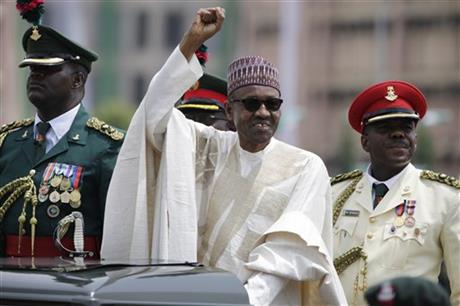
By MICHELLE FAUL
Nigeria’s new president was sworn in on Friday and pledged to tackle Boko Haram “head on,” asserting the fight against the Islamic extremists wouldn’t be won until hundreds of schoolgirls abducted last year and other kidnapping victims were brought home alive.
Muhammadu Buhari’s new administration won a signal of support from the United States, which indicated it was prepared to increase military aid.
The inauguration turned into a nationwide celebration by Nigerians welcoming their country’s newly reinforced democracy after Buhari became the first candidate to defeat a sitting president at the polls since the end of military rule in 1999.
With dancing and the release of white doves symbolizing peace, Nigerians hailed the handover of power in an African nation marked by superlatives: the most populous nation, the biggest oil producer, the largest economy.
Nigeria also confronts the most deadly conflict on the continent — the insurgency by Boko Haram that has killed more than 13,000 people and driven more than 1.5 million from their homes.
Blaming official bungling, negligence, complacency and collusion for allowing the Islamic extremists to grow into “a terrifying force,” Buhari pledged to take on Nigeria’s myriad problems. “We are going to tackle them head on,” he declared.
“But we cannot claim to have defeated Boko Haram without rescuing the Chibok girls and all other innocent persons held hostage by insurgents,” he said, referring to the hundreds of girls seized more than a year ago from their school in Chibok in northeastern Borno state.
“This government will do all it can to rescue them alive.”
The military has freed hundreds of captured women and children in recent weeks as it hemmed Boko Haram into its stronghold in the Sambisa Forest, but there has been no word of the schoolgirls whose abduction brought an international outcry.
U.S. Secretary of State John Kerry was the first foreign official to meet with Nigeria’s new leader after the inauguration, accompanied by head of U.S. Africa Command, Gen. David M. Rodriguez. A senior State Department official said Washington was ready to increase military aid and could quickly send more advisers.
“Congratulations to @MBuhari & the Nigerian people. A privilege to be here to celebrate #Nigeria’s historic & peaceful democratic transition,” Kerry tweeted.
The 72-year-old Buhari had earlier pledged to root out human rights violations by the Nigerian military — abuses that had prevented full military cooperation from the U.S. and Britain.
Departing President Goodluck Jonathan last year halted U.S. training of a battalion of Nigerian troops to fight Boko Haram. No reason was given but his officials had expressed anger at U.S. refusals to sell Nigeria weapons, including helicopter gunships.
The United States and former colonizer Britain were hindered by laws preventing certain weapons sales to countries whose militaries are accused of gross human rights violations. Nigeria’s military is accused of killing detainees and civilians and burning their homes in revenge for Boko Haram attacks.
Buhari addressed those concerns Friday, promising to overhaul rules of engagement to prevent abuses and to take “disciplinary steps” against violators of human rights.
He also thanked the leaders of neighboring Cameroon, Chad and Niger for sending troops for a multinational offensive that this year has driven Boko Haram from towns where it had declared an Islamic caliphate.
Suicide bombings, abductions and hit-and-run attacks continue in northeastern Nigeria by what Buhari called “a mindless, godless group as far away from Islam as you can think of.” Hours before his inauguration a double-explosion blamed on the insurgents in the Borno village of Tashan-Alede killed seven people and injured several others, said survivor Ibrahim Bitrus.
Gov. Kashim Shettima, who was sworn in Friday for a second term as governor of Borno, the birthplace of Boko Haram, pledged to rebuild the hundreds of communities destroyed by the insurgents.
The insurgency has “preyed on our young girls, and did all it could to terminate their hope for education and a good life, while turning our women into objects of enslavement and as sex objects,” Shettima said.
However, he surprised those in attendance by saying he would appeal to the federal government to allow the rehabilitation of Boko Haram fighters who come out of the bush and de-radicalize — a move he said was essential for national reconciliation.
“It is never easy to accept back into the community those who have taken up arms, killed, pillaged, raped and destroyed,” he said. “But in the long run society must make very expensive choices for peace, reconciliation and development.”
Many Nigerians consider Buhari, a retired major-general who subdued a smaller Islamic uprising when he ruled briefly as a military dictator in the 1980s, to be the right person to govern at this time of crisis. An austere disciplinarian, he is the only Nigerian leader not to have enriched himself from the state treasury.
Buhari has pledged to fight the endemic corruption that has kept Nigeria, a nation rich in natural resources, so impoverished.
Political science professor Richard Joseph of Northwestern University said Buhari’s victory was a sign of hope.
“The world desperately needs a victory against cultist jihadism. Nigeria (under Buhari) can provide it,” he wrote in a blog.
On Friday, Buhari saluted all Nigerians, whether or not they voted for him.
“I belong to everybody and I belong to nobody,” he said to applause. “I intend to serve as president to all Nigerians.”
He takes over a nation in crisis: government coffers that have been hit by massive corruption, a devalued currency, low oil prices and a $63 billion debt which grows as Nigeria borrows more to pay government salaries.
Some nervous politicians feared Buhari’s promise to retrieve ill-gotten gains signaled a witch hunt. “These fears are groundless,” Buhari said, though he added that some of his predecessors had acted “like spoiled children, breaking everything in the house.”
___
Associated Press Diplomatic Correspondent Bradley Klapper contributed to this report from Abuja.



